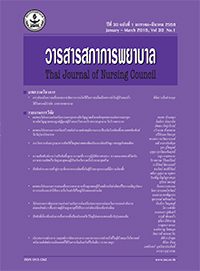ผลของโปรแกรมส่งเสริมความผาสุกทางจิตวิญญาณด้วยหลักพุทธธรรมต่อความผาสุกทางจิตวิญญาณของญาติผู้ดูแลผู้ป่วยมะเร็งทางนรีเวช ระยะลุกลามในโรงพยาบาล
Keywords:
หลักพุทธธรรม ความผาสุกทางจิตวิญญาณ, ผู้ป่วยมะเร็งทางนรีเวชระยะลุกลาม, ญาติผู้ดูแล, Buddhist teachings, spiritual wellbeing, advanced gynaecological cancer patient, family caretakerAbstract
บทคัดย่อ: วัตถุประสงค์: เพื่อศึกษาผลของโปรแกรมการส่งเสริมความผาสุกทางจิตวิญญาณด้วยหลักพุทธธรรมต่อความผาสุกทางจิตวิญญาณของญาติผู้ดูแลผู้ป่วยมะเร็งทางนรีเวชระยะลุกลามในโรงพยาบาล
การออบแบบการวิจัย: การวิจัยกึ่งทดลอง
วิธีดำเนินการวิจัย:กลุ่มตัวอย่างเป็นญาติผู้ดูแลผู้ป่วยมะเร็งทางนรีเวชระยะลุกลามในโรงพยาบาลตติยภูมิแห่งหนึ่งในภาคใต้จำนวน 45 ราย แบ่งเป็นกลุ่มควบคุมที่ได้รับการพยาบาลตามปกติ 25 ราย และกลุ่มทดลองที่ได้รับโปรแกรมการส่งเสริมความผาสุกทางจิตวิญญาณด้วยหลักพุทธธรรม 20 ราย เครื่องมือที่ใช้ในการทดลองประกอบด้วย โปรแกรมการส่งเสริมความผาสุกทางจิตวิญญาณด้วยหลักพุทธธรรม ส่วนเครื่องมือที่ใช้ในการเก็บข้อมูลประกอบด้วย แบบสอบถามข้อมูลทั่วไป และแบบสอบถามความผาสุกทางจิตวิญญาณ วิเคราะห์ข้อมูลส่วนบุคคลโดยใช้สถิติพรรณนา และทดสอบสมมติฐานด้วยสถิติทีคู่ และสถิติทีอิสระ
ผลการวิจัย: ผลการวิจัยพบว่าค่าเฉลี่ยคะแนนความผาสุกทางจิตวิญญาณของกลุ่มทดลองหลังการทดลองสูงกว่าก่อนการทดลองอย่างมีนัยสำคัญทางสถิติ (t = 13.324, p <.001) และค่าเฉลี่ยคะแนนความผาสุกทางจิตวิญญาณของกลุ่มทดลองหลังการทดลองสูงกว่ากลุ่มควบคุมหลังได้รับการพยาบาลตามปกติอย่างมีนัยสำคัญทางสถิติ (t =7.87, p < .001)
ข้อเสนอแนะ: พยาบาลผู้ให้การดูแลผู้ป่วยมะเร็งทางนรีเวชระยะลุกลามและญาติผู้ดูแล ควรนำโปรแกรมดังกล่าวมาใช้เพื่อส่งเสริมความผาสุกทางจิตวิญญาณของญาติผู้ดูแลผู้ป่วยมะเร็งทางนรีเวชระยะลุกลาม เพื่อช่วยให้สามารถดูแลผู้ป่วยอย่างต่อเนื่องต่อไป
Abstract:Objective: To examine the impact that a spiritual wellbeing promotion programme based on Buddhist teachings had on the spiritual wellbeing of family caretakers who were taking care of hospitalised advanced gynaecological cancer patients.
Design: Quasi-experimental research.
Implementation: The subjects were 45 family caretakers taking care of advanced gynaecological cancer patients in a tertiary Southern Thailand hospital. The subjects were divided into 2 groups, 25 in the control group and 20 in the experimental group. Those in the control received standard care treatment, whilst those in the experimental group participated in the Buddhism-based spiritual wellbeing promotion programme. The instruments included the Buddhism-based spiritual wellbeing promotion programme, which was used to conduct the experiment, and two questionnaires—a general information questionnaire and a spiritual wellbeing questionnaire—both of which were used to collect data. The data were analysed using descriptive statistics, and the hypotheses were tested using a paired T-test and an independent T-test.
Results: The study showed a significant post-experimental increase in the degree of spiritual wellbeing amongst the members of the experimental group, by t = 13.324, p < .001. Moreover, the experimental group displayed a significantly higher post-experimental spiritual-wellbeing average than the control did, at t = 7.87, p < .001.
Recommendations: It is recommended that nurses and family caretakers responsible for advanced gynaecological cancer patients adopt this programme to improve the patients’ spiritual wellbeing in the long term.








